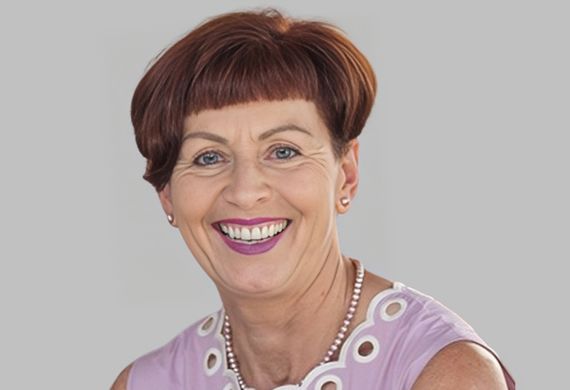
Transforming Oil & Gas: Empowering Women Leaders through Strategic Mentorship
By: Barbara Oberhauser, Senior Vice President, Leading Oil and Gas Company
Having over two decades of experience in various industries, Barbara oversees Nayara's HSEF policies, standards, and objectives. She provides strategic guidance, manages risk, and reports on HSEF performance to stakeholders, also serving as Functional Manager for all HSEF departments.
In a recent conversation with the Women Entrepreneurs Review magazine, Barbara discusses mid-career barriers faced by women in the oil & gas industry and presents effective strategies to overcome the challenges. Addressing STEM talent shortages, she emphasizes attracting a diverse workforce. She also highlights aligning mentorship for mid-career professionals with broader leadership development goals.
In your view, what are the most critical barriers that women in mid-career face in advancing to senior leadership roles in the Oil and Gas sector, and how can industry leaders effectively address these challenges?
The biggest barrier that women experience is set by themselves: they don't dare to do it! Women are by far too critical of themselves and their abilities. This is the case in all sectors, and it hardly makes any difference which branch of industry it is - well, yes, even more pronounced in technical areas. Managers must be made aware of this and then they can, and should take active control, motivate and advise women, even push them.
As a mentor in the 1000 Women Leaders Program, what unique insights have you gained from interacting with mid-career professionals that could reshape how organizations approach talent development and retention strategies in an industry?
As a mentor in the 1000 Women Leaders Program I have primarily realized three things, first, India has an immense potential with so many engaged, enthusiastic and highly skilled ladies; second, they are very self-confident and have a confident demeanor; they have a strong voice in every aspect. And third, they are facing the same challenge of self-limitation. To overcome this limitation, this could be part of the agenda in high-schools or at the University, as basis where industry can build on later.
With digital transformation reshaping operational models in Oil and Gas, how can women leaders leverage technology and data analytics to drive efficiency and innovation within their organizations?
Digital transformation offers new opportunities; all the clichés that women don't have the necessary strength, that they shouldn't be expected to work in harsh working conditions, are obsolete. New skills, like agility, data mining, are requested.
Looking ahead, what strategic advice would you offer to industry leaders who are committed to enhancing gender parity and supporting women's leadership development in traditionally male-dominated sectors like Oil and Gas?
Industry leaders, males as well as females, have to learn to disregard their mostly unfounded and biased judgements. In some situations, a quota might help, although I was, and for the most part still I am, against a quota. However, the experiences show in many cases, gender parity will never work without a quota.
Considering the global talent shortage in STEM (Science, Technology, Engineering, and Mathematics) fields, how can the oil and gas industry attract and retain more diverse talent, particularly women, to meet future industry demands?
To mitigate the shortage in STEM, industry should set-up and finance CSR programs with impact on the society. Very often focus needs to be more in rural areas. The programs have to include education, starting very early in kindergarten, to make kids curious, to show them the fascination of science, and have to span through all kinds of schools and levels of education.
Equally important is education of parents, even relatives, and the neighborhood as well, to encourage the children. Or at least, not to discourage them, to oppose - I do know such cases.
And the industry, in addition to the state, should grant scholarships.
It is important to have the right programs in place, to awaken curiosity when kids are very young, to maintain this curiosity and to help them later at university to decrease the dropout rate.
How can mentorship initiatives tailored to mid-career women professionals in Oil and Gas align with broader industry efforts to develop a diverse pipeline of future leaders?
I think mentorship initiatives for mid-career women professionals are not tailored especially for the oil and gas industry, whereas there might be nuances of difference between purely finance sectors and the manufacturing industry.
At the end, two aspects have to be addressed a) to support women to trust their ability and b) to convince leaders that gender parity is of benefit for the company. Always!
Most Viewed
- 1 Women's Health Startup HerMD Closing Doors Amid Industry Challenges
- 2 5 Famous Women in Indian Armed Forces
- 3 Saudi Women No longer Require Male Permission for Clothing Choices, says Prince MbS
- 4 Kolkata Medtech Startup Innovodigm Raises Rs 5.5 Crore Seed Funding Led by IAN Group
- 5 Yamunanagar's Kashish Kalra Honoured after Securing 111th Rank in UPSC Civil Services Exam
- 6 Madurai Appoints Its First Woman Corporation Head
- 7 IAS Vijayalakshmi Bidari Appointed as the new Nagpur Divisional Commissioner
- 8 American Entrepreneur Lucy Guo Overtakes T Swift to become Youngest Female Billionaire
- 9 ICC Women's World Cup 2025 Trophy Showcased at Indore's Holkar Stadium
- 10 Aparna Saxena's Beauty Venture AntiNorm Launches in India
- 11 Vidya Nataraj Co-Founded BlueStone Jewellery & Lifestyle files IPO
- 12 5 Women Freedom Fighters of India
- 13 Dr. G Krishnapriya appointed as CEO for Trichy
- 14 M3M & Sirona Partner to Introduce Menstrual Hygiene Vending Machines in 15 Locations
- 15 Punjab Govt launches SHE Cohort 3.0 Supporting Tech-led Women Startups
- 16 Indian origin Lawyer, Sweena Pannu appointed as the US New Superior Court Judge
- 17 The Aurora Tech Award recognizes 4 Indian Women-led Startups
- 18 Kerala's Republic Day parade featured an all-female tableau
- 19 Manisha Kabbur Becomes Karnataka's First Woman International Karate Coach
- 20 Director K. S. Ravikumar's Daughter Maalica Ravikumar Launches Life Coaching Company 'Evergrowth Academy' for Women
- 21 Leezu's Raises Pre-Seed Funding to Accelerate Growth in Sexual Wellness Industry
- 22 Sattu: Super-easy summer drink for PCOS gut healing
- 23 Swathi Nelabhatla creates Sitha App, India's First Women-Exclusive Gig Platform
- 24 7 Timeless Female Kathak Dancers & their Iconic Legacies
- 25 Meet 7 Iconic Women Architects of Modern India & their Most Impactful Work
- 26 This Woman-led Insuretech Startup is Helping Bridge the Education Financing Gap in India
- 27 Women Leaders Share Lessons Learnt from India Women's WC Win
- 28 5 Enterprising Women Founders Powering Singapore's Tech & Innovation Landscape
- 29 4 Women. 4 Stories. One Vision for Smarter, Stronger Healthcare
- 30 Global Gender Gap Narrows to 68.8%, But Full Equality 123 Years Away: WEF Report 2025
- 31 Changemakers: 7 Women Entrepreneurs Taking the Make in India Movement Forward
- 32 Meet Lucy Guo, The Youngest Self-Made Female Billionaire Disrupting Tech
- 33 How Women are Driving India's Festive Online Shopping Surge






